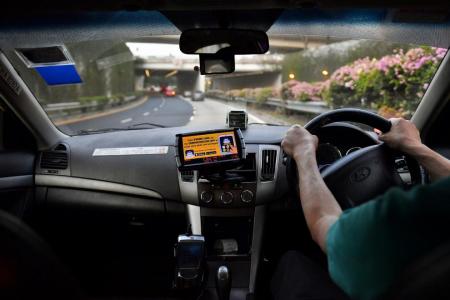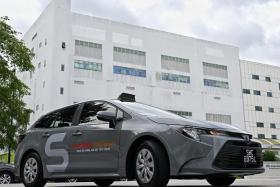Inward-facing cameras in taxis must not record audio
LTA issues guidelines on use of inward-facing video cameras in taxis and private-hire cars from June 22
Taxis and private-hire cars can be equipped with inward-facing video cameras from June 22, when new rules governing their use kick in.
The in-vehicle recording devices - to tackle fare evasion and abuse of drivers - will capture only video footage without audio, so passenger conversations are not recorded.
Vehicles with such cameras must display notices informing commuters of them, and if the taxis or private-hire cars are booked in advance, ride-hailing apps or cab companies must alert customers that the cars they are dispatching are equipped with these devices.
These are among the rules issued by the Land Transport Authority (LTA) yesterday.
They follow on from advisory guidelines published by the Personal Data Protection Commission last month regarding in-vehicle recording by transport service providers.
Since 2015, the National Taxi Association (NTA) has been lobbying for the use of inward-facing cameras.
While there are no rules prohibiting their use, privacy laws have created some uncertainty.
In 2013, ComfortDelGro installed inward-facing cameras in its taxis, but it has since removed all of them.
LTA's new guidelines provide cab operators and private-hire car fleet owners with greater clarity.
For one thing, they must seek LTA's approval to fit the cameras, and use only authorised installation centres.
These centres could be the taxi operators themselves, for example, if they apply to and are approved by LTA.
This ensures the cameras are installed according to the manufacturer's requirements, and prevents the devices from being tampered with, LTA said.
The centres must ensure the cameras are secured, and the data contained cannot be downloaded or accessed without authorisation - such as by locking the memory card slot.
The inward-facing camera must also be installed in a fixed position, so it cannot be rotated to capture any compromising footage of passengers.
Fleet owners must carry out regular checks on their vehicles to ensure the recording devices have not been tampered with.
Private-hire drivers who use their own vehicles may choose to install such cameras, but they need to obtain permission from LTA.
NTA executive adviser Ang Hin Kee said it would be better if audio recording was allowed, as it would be helpful in cases of verbal disputes.
Mr Ang, who is also executive adviser to the National Private Hire Vehicles Association, said audio recordings can be kept secure as well.
ComfortDelGro said it welcomed the clear guidelines, but did not say if it will install the cameras.
Trans-Cab general manager Jasmine Tan said her company was looking into how the video data can be securely stored.
Premier Taxis also said it was evaluating the new rules.
Bank executive Nelson Lee, 26, said: "There is less privacy as a passenger, and I will feel scrutinised...
"But if it also helps protect passengers and drivers to avoid any dispute, I am not totally against it."
Get The New Paper on your phone with the free TNP app. Download from the Apple App Store or Google Play Store now



